The Way It Is/ Developing Ford's GT & Mustang GT350Rby Gordon Kirby |
 Scott Maxwell and Billy Johnson did the early testing of Ford's Le Mans-winning GTLM car. They're also leading this year's IMSA Continental Tire SportsCar Challenge after winning the last two races at the wheel of Multimatic's Ford Shelby GT350R-C.
Scott Maxwell and Billy Johnson did the early testing of Ford's Le Mans-winning GTLM car. They're also leading this year's IMSA Continental Tire SportsCar Challenge after winning the last two races at the wheel of Multimatic's Ford Shelby GT350R-C.
Maxwell and Johnson are classic examples of talented open-wheel racers who couldn't find the money to move up the ladder but went on to build successful and rewarding careers in sports car racing. I talked to them after their recent win at Lime Rock about the season so far, their test work for Ford and Multimatic, and the satisfaction they've achieved from their racing careers post open-wheel racing. "When I was coming up all I thought about was doing Formula Ford and then Atlantic and then Indy Lights," Maxwell says. "But it was so expensive to move up and today, in sports and GT cars, there are opportunities for young guys where they can get paid to drive rather than having to chase sponsorship all the time." Maxwell recalled how he met Multimatic founder Larry Holt in the early nineties after winning Canada's Formula Vee and Formula Ford championships with Brian Stewart Racing. 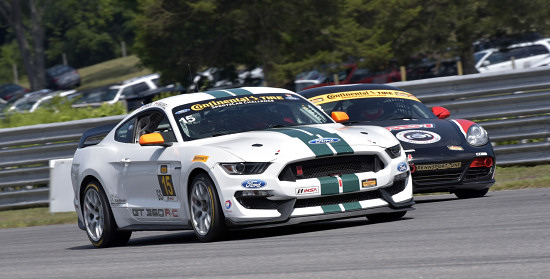 © Gary Gold "That was when Larry Holt walked in the door one day and said he had a plan. He explained his idea and said come to my office and we'll go through the details. I had heard a lot of this kind of talk. A lot of different guys said they were going to do this or that for me and really, nothing had happened. But I thought I should go meet the guy at his office. "At that time he had a very small company but he had a vision and a plan and he had the resources to do it. He's also a compelling guy, as you know. So he convinced to me to put aside my Indy car dream and to drive showroom stock cars for him. It felt like a downward step but in reality it was a temporary sideways move because I could see there was a potential future. "This was way back in 1992 and at that point there was me and a couple of volunteers. But the company started growing fast and a couple of years later Larry hired Sean Mason to be Multimatic's second motor racing employee and it's just grown from there. "It's extended my career greatly. When you're young you don't really care about development. It helps you, but you're there to go fast, beat the other guy, win races and move up. But with Multimatic I've learned to be a test and development driver." Born and raised in California, Billy Johnson raced karts, Skip Barber and Formula BMW cars before switching to sports cars in 2005. "I discovered you needed a huge pocketbook to continue in formula cars because it was so expensive," Johnson says. "I came from a regular, middle class family. My parents sacrificed a lot to get my career off the ground but they could only take me so far and I found it impossible to find the money to move up in formula cars. "But I found much more inexpensive rides in sports and GT cars. I drove a BMW Z4 that was really built out of a guy's garage beside his house. He didn't have a real shop. It was his actual garage. He had a little pipe-bender and bent the tubes to build a roll cage. "I was able to get discounted rates with gentlemen drivers by helping coach them and being a fast teammate. That brought value to the team and eventually brought me free rides with better teams. 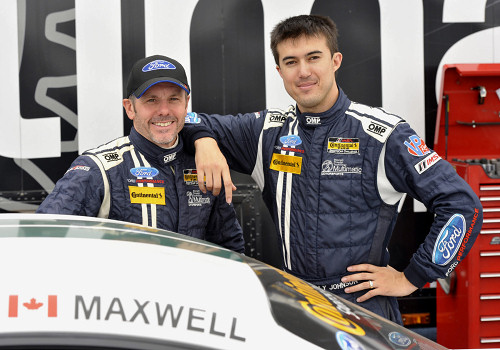 © Gary Gold Maxwell started his new life in sports and GT racing by driving front wheel drive ford Tauruses for a few years for Multimatic before moving up to a series of Mustangs. "Multimatic designed and built a Mustang GTS1 in 1995 and I finished third its debut at Lime Rock in IMSA's GTS series behind Irv Hoerr and Darren Brassfield," he recalls. "That was the first real development program we did with Ford and it showed we could do the job. That was also the first time we ventured south into the United States and that was always part of Larry's plan." Sean Mason is Larry Holt's right hand man at Multimatic. Mason runs the Mustang Continental Tire program with just three full-time mechanics. "We can always bring in more guys from Multimatic if we need them," Maxwell notes. "This is all part of Ford's Performance Division. This is the third generation Mustang that Multimatic has developed and raced. It started with the FR500 in 2005, then the Boss 302 in 2011 and now the latest GT-350R. "Multimatic has been doing Ford's in-house development program for its GT cars and we've been racing Fords on and off since 1992 and '93," he adds. "So there's a long heritage. The Mustang program has linked us to Ford so that Multimatic has developed a strong connection with Ford. We develop and build performance parts for Ford and when the GT program came along Multimatic was selected as the company to develop and build both the road car and the racing car." Maxwell described Multimatic's approach to the business of racing. "Larry and Multimatic does every program properly," he emphasized. "We don't take a product somebody else has developed and fine-tune it. We start from ground zero and that has allowed me to develop a feel for the car and learn how to develop a car. "I think I've always had the feel but Multimatic and Ford gave me the forum to evolve and be calm about it. When you're a young guy trying to make it in racing you don't get a lot of track time. You can't afford any testing and at the races there's limited practice time, maybe thirty minutes, and you're trying your hardest and throwing different things at the the set-up. But are you really learning? "At Multimatic we spend days, weeks and months developing a car. You're isolating problems and working with smart engineers. If I can give those guys the direction and feedback they need, they can take it from there. It's great to enjoy that kind of working relationship." The current Mustang GT350R program started in 2014. The car features independent rear suspension and a flat-crank engine. "The big thing with this car is it has independent rear suspension," Maxwell said. "In all the Mustang programs I've been involved with since the mid-nineties this is probably the biggest departure. They've all been small developments and evolutions but this is a much bigger step. It's got independent rear suspension, a flat crank engine and much better aero. "All the talk was about the engine because nobody other than Ferrari has done a flat crank engine for this type of car. The engine has been the center of the program. At times it's been the strength of the program but it's also been its Achilles Heel. 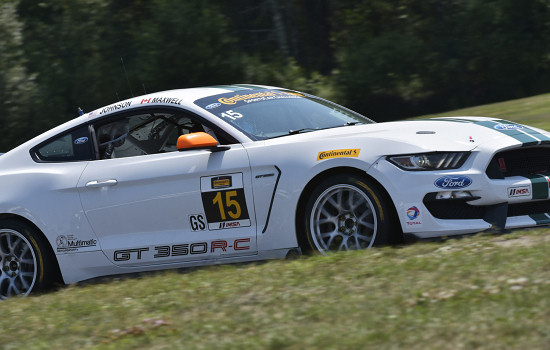 © Gary Gold "The series has had some problems and has lost some cars. They needed cars for the series so the Porsche Cayman came into the series. IMSA made some BoP allowances to encourage the Porsche to come in." Neither Maxwell not Johnson are fans of IMSA's often contentious and always changing Balance of Performance (BoP) rules. "The politics of the BoP is crazy," Maxwell declares. "No one is ever happy. I struggle with it because I go back to the era where if someone came out with a better tool you had to go home and figure it out and make something better. That to me is what racing's all about. "If a bunch of smart guys come up with something and you give it to a good team with good drivers you're almost penalized for doing a better job. To me, the BoP encourages mediocrity rather than rewarding someone for doing a better job." Johnson says Multimatic's Mustang has been unfairly penalized because the team does a better job across the board than its competitors. "Our weakness is Balance of Performance," Johnson remarks. "We're the worst car in our class in brakes, on tire wear and on cornering. We don't have much downforce and the Porsche has better brakes, good cornering and a clutch-less PDK gearbox. They have less power than us, but they shift faster. "We have a very small straightline advantage but later in the run on worn tires we're slower on the straights because we're going through the corner slower. So overall, we're at a disadvantage in performance. "Where we make up for it is with consistency, race management and strategy. We tend to be able to manage traffic better and have really good racecraft. That's what helped us win at Lime Rock. We had great pit strategy and really good tire changes that gave us fourteen seconds on our competitors. "Our advantage comes from the team and our driving performance, but we are losing out on the BoP because of the team advantage. IMSA is basing our BoP on our overall performance rather than the performance of the car alone. So that makes it very difficult." Maxwell says he and Johnson won at Lime Rock because the team did a better job at all elements of the game. "We were a little slower than the Porsche, about half a second off, but our pitstops were just superb," Scott said. "Billy and I didn't make many mistakes but we didn't win the race on the track. We won it in the pits. We made five or six seconds on them on each stop and that was enough to win the race." Johnson agrees with Maxwell's assessment. "We didn't have the fastest car, especially over the course of a run," Johnson said. "We were able to get through traffic really well and gain a little bit on them there, but it was the awesome pitstops that won the race for us. The tire changes were perfect and super fast. "After I took over, Scott was reading off the lap times to me on the radio and keeping me briefed on lapped traffic. So it was definitely a team effort and we need everything to come together like it did at Lime Rock to be able to win races." 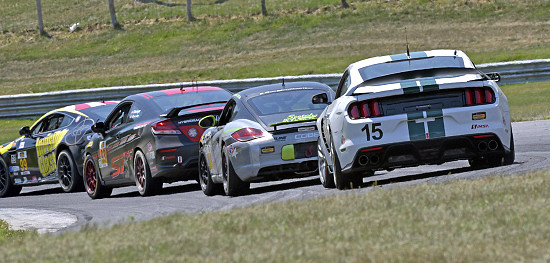 © Gary Gold "Sports car racing in general is booming around the world," Scott observed. "The fans are into the cars and I think IMSA needs to adopt the GT4 formula, which is the worldwide formula based on production cars. But they're also thinking about LMP3 and other things. I think they're either confused or they're desperate. "With GT4 you have a world class where you can have a huge list of factories who are prepared to build a run of 500 ready to run race cars. You could run those cars in the United States, or in Europe or Japan and you would encourage a big field of international competitors and teams." Maxwell and Johnson are proud of the time and effort they put into Ford's already successful GT program. "It percolated for a long time," Maxwell said. "Five or six years ago there was rumbling about it, then it went away for a while before it came back and actually happened. I was involved in it with Multimatic from day one and it was only logical that I was the guy to do the early testing because Ford wanted it all kept in-house at that time. "Understanding the history of how it all came together I was thrilled and honored to be involved in it. The focus for me now is developing the road car but I was involved in all the initial testing last year and it was a lot of fun. "It's a beautiful car and like I say, it's been great to be involved with the program. Right from the start you could tell it was a good car. You could sense right away that it had heaps of downforce. It felt planted and the engine was great. It was clear the car had huge potential. "The amazing part was it was so reliable from the get-go. That allowed us to put in a lot of early miles and get plenty of test time on the car." I asked Scott if he was surprised that wins came so quickly, Le Mans included. "I was surprised in the sense that the GTLM category has got to be IMSA's toughest class because you've got so many manufacturers competing," he said. "Corvette, Ferrari, Porsche and BMW are all there with good teams and drivers. Every team is capable of winning. They've got good cars, engines, drivers, engineers and teams. It's a very competitive category. "So I'm a little surprised but I think they did it right from the get-go, from the concept and design of the car to getting Ganassi to run the team. If you give a team like Ganassi a good product, which I think we did, they can take it the rest of the way and they've done that. The same with George Howard-Chappell in the UK. We handed the cars over to people who know what they're doing. They're not learning. They've done this for years. It's just a different vehicle. "There are always errors. Daytona was a bit of a setback, but it didn't surprise me. No matter how much testing you've done, you always have some problems when you first go racing with a new car. But to win Le Mans was everything. To win that race first time out was just fantastic. To me, it was a little surprising to win that race in the first try with the car. You almost expect to fall on your face the first year and then come back the second year ready to win. 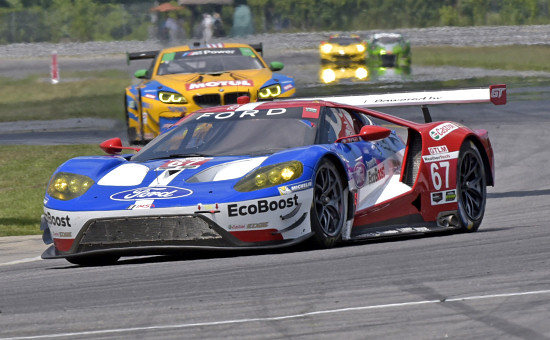 © Gary Gold As well as joining Maxwell for the Ford GT's early testing Johnson raced one of the GTs at Le Mans. "I couldn't have asked the Ford Motor Company and Multimatic for a better opportunity than to drive with Scott Maxwell," Johnson said. "It's just been awesome to work with Scott and Multimatic on the development side and at the race track with both the GT350R-C and the Ford GT as well as the development of street cars. "Scott and I helped develop the GT350 street car and we're also working on the development of the GT road car so it's been a fantastic ride and an amazing opportunity to work with all the great people at Multimatic and to work with Scott and all these programs. I'm part of something that's very special." Johnson turned in an impressive performance at Le Mans, turning laps as quick as anyone in the team. "At one point I turned the fastest race lap in the GT class," Johnson grinned. "It was a record for a couple of hours and then Scott Dixon beat me by sixteen-thousandths of a second. He's a great guy and if it had to be anyone, I'm glad it was him." In closing I asked Johnson and Maxwell to discuss their strengths and weaknesses in IMSA's final four races of the year. "Road America will be interesting," Johnson said. "Both Road America and CoTA are really hard on tires and brakes. It's going to be a tough road. We have to keep digging and doing what we're doing." Added Maxwell: "Road America might be our strongest track because we have good horsepower and aerodynamics. It's not my style to go for points but if we keep going the way we're going and keep pounding in points we're going to be okay. But that's not what we do. Because there are only eight or nine cars in our class, the Porsche guys have got to start winning races." Neither Maxwell nor Johnson are sure what they will be racing next year, but that's not a concern for Maxwell. 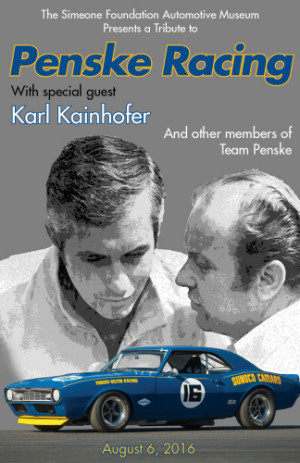 *Next Saturday, August 6th I will have the pleasure of moderating a discussion with Karl Kainhofer and at least a dozen other former Penske Racing employees at the Simeone Foundation Automotive Museum in Philadelphia. The event will begin at noon on August 6th and will be followed by a 'Penske's Maestro' book signing. We look forward to seeing any readers who live in the Philadelphia area. Team members who are profiled in the book and are scheduled to participate include Charles Cantwell, Don Cox, Lew Davis, Mark DeLong, Leroy Gane, John Houp, Geoff Miller, Grant Newbury, Jay Signore, Judy Stropus, George Wintersteen and John Woodard. On display during the event will be an original 1968 Sunoco Camaro that was raced by Mark Donohue in the Trans-Am series. The car is owned by Mr. Irwin Kroiz, who has loaned it to the museum for the event. Admission to the event is included with regular museum admission. More information on the event, including directions to the museum, is available at: simeonemuseum.org/events/tribute-penske-racing-karl-kainhofer-team-penske-members |
|
Auto Racing ~ Gordon Kirby
Copyright ~ All Rights Reserved |
